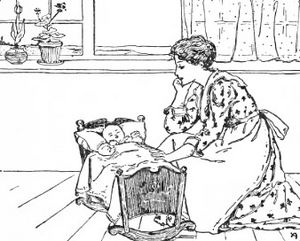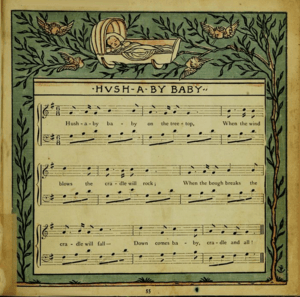Rock-a-bye Baby facts for kids
Quick facts for kids "Rock-a-bye Baby" |
|
|---|---|
 |
|
| Nursery rhyme | |
| Published | c. 1765 |
"Rock-a-bye Baby" is a very old and famous nursery rhyme and lullaby. People sing lullabies to help babies fall asleep. This rhyme has been around for a long time, helping parents soothe their little ones.
Contents
What are the Lyrics?
The words to "Rock-a-bye Baby" have changed a bit over the years. The very first time it was printed was around 1765 in a book called Mother Goose's Melody.
Here's how the first version looked:
- Rock-a-bye baby
- in the tree top.
- When the wind blows
- the cradle will rock.
- When the bough breaks,
- the cradle will fall.
- And down will come Baby,
- Cradle and all.
Later, in 1791, another version of Mother Goose's Melody started with "Hush-a-bye baby" instead.
The Most Common Version Today
The version most people know and sing today is:
- Rock-a-bye baby, on the tree tops,
- When the wind blows, the cradle will rock,
- When the bough breaks, the cradle will fall,
- And down will come baby, cradle and all.
There are also other versions that have more lines, like one that talks about Mother catching the baby. Another version has a different ending, focusing on the baby sleeping sweetly.
When Was it Published?
The words of "Rock-a-bye Baby" first appeared in a book called Mother Goose's Melody around 1765. This book was likely published by John Newbery, who was a famous publisher in London. The book was also printed in Boston, USA, in 1785.
The phrase "Rock-a-bye" itself was first written down in a book called Songs for the Nursery in 1805. This book was put together by Benjamin Tabart.
How Did the Melody Become Popular?
It's not clear exactly when the tune we know today became linked with the words. However, the melody became very popular later on.
In 1887, a group of performers called the Moore and Burgess Minstrels advertised a "new" American song called 'Rock-a-bye' in a London newspaper, The Times. They said it was a "charming" song.
This "new" song was a big hit right away. The newspaper later said that "The new and charming American ballad, called ROCK-A-BYE, which has achieved an extraordinary degree of popularity in all the cities of America will be SUNG at every performance."
This suggests that the song was already very popular in America before it became famous in London. By 1891, the tune was well-known in the United States. Newspapers from that time gave credit for the song's music to two different people from Boston: Effie Canning and Charles Dupee Blake.
 | Janet Taylor Pickett |
 | Synthia Saint James |
 | Howardena Pindell |
 | Faith Ringgold |


